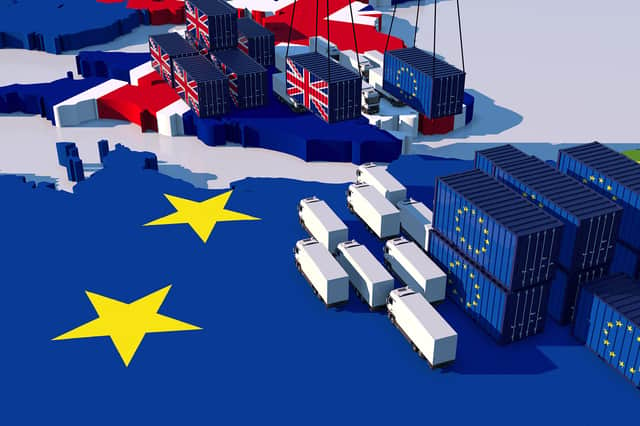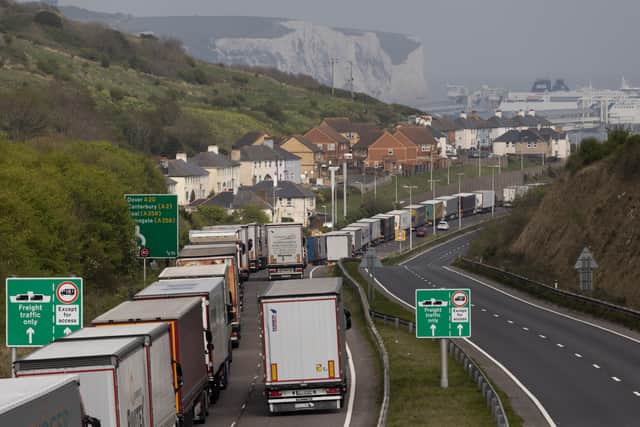Brexit: businesses say new import checks are 'in disarray' after reports controls may be delayed again
and live on Freeview channel 276
Businesses are furious about being left in the dark after reports surfaced that the government’s post-Brexit import checks could be delayed again.
Goods from Britain have faced EU controls since it left the bloc’s single market at the start of 2021, but the UK has repeatedly put off checks in the other direction. The new border model was delayed five times due to inflationary fears, but finally started being implemented in January.
Advertisement
Hide AdAdvertisement
Hide AdFrom 30 April, importers will have to pay up to £145 to bring small amounts of products such as cheese, salami and fish through the port of Dover or the Eurotunnel. The Department for Environment, Farming and Rural Affairs said that documentary, physical and identity checks would begin at the border for medium risk animal products, plants and plant products on the same date.
However, the Financial Times has reported that this could be delayed to avoid serious disruption. It claims to have seen a Defra presentation which effectively calls for zero checks on “commodity groups” to avoid huge queues.
The government has denied this would be the case, and a spokesperson told NationalWorld that it was always planned to slowly phase in the checks. “Taking a pragmatic approach to introducing our new border checks minimises disruption, protects our biosecurity and benefits everyone – especially traders,” they said.


But businesses have hit out at the government over the confusion, less than two weeks before the border controls are due to come in. Martin McTague, national chair of the Federation of Small Businesses, said: “New import charges on plant and food products are supposed to be introduced in less than two weeks, but the system is in complete disarray.
Advertisement
Hide AdAdvertisement
Hide Ad“The government has bypassed formal channels and left small firms out of the conversation. It’s left them unsure as to who they can trust. Many have invested considerable time and money making sure they’re getting it right, but now they’re left scratching their heads at the conflicting messages coming out of Whitehall – will they or won’t they face these checks and have to start paying on 30 April?
“Government has had years to get this right. Small firms deserve clarity, and they really do not have time to decode messy and unclear Whitehall messages that contradict each other.
“These new import rules have already been delayed five times and because of that, small firms already feel like they’ve been given the runaround. Confusion takes away their ability to plan – they cannot plan if they are constantly on tenterhooks, wondering whether new rules are coming in or not. The government really ought to put small firms, the most affected by these changes, at the heart of the conversation.”


The British Chambers of Commerce agreed. Will Bain, head of trade policy, added: “Any further confusion and uncertainty around the introduction of new border checks and costs is bad news for business. Business urgently needs to see crystal clear communication from Defra on its plans, and if any changes are being made then they need to know now.”
Advertisement
Hide AdAdvertisement
Hide AdDefra denied that the checks were being delayed, and claimed businesses have been consulted throughout the roll out. “As we have always said, the goods posing the highest biosecurity risk are being prioritised as we build up to full check rates and high levels of compliance,” the spokesperson said.
“There has been extensive engagement with businesses over the past year – with our approach welcomed by several trade associations and port authorities. We will continue to work with and support businesses throughout this process to maintain the smooth flow of imported goods.
“We are confident we have sufficient capacity and capability across all points of entry to handle the volume and type of expected checks. It is important to remember the cost of our border checks is negligible compared to the impact of a major disease outbreak on our economy and farmers.”
The checks have been repeatedly delayed over concerns they could fuel inflation. A recent report by Allianz Trade found the controls will add a bill of £2billion to consumers and could push up inflation, which has dogged Rishi Sunak’s time in office.
Advertisement
Hide AdAdvertisement
Hide AdRalph Blackburn is NationalWorld’s politics editor based in Westminster, where he gets special access to Parliament, MPs and government briefings. If you liked this article you can follow Ralph on X (Twitter) here and sign up to his free weekly newsletter Politics Uncovered, which brings you the latest analysis and gossip from Westminster every Sunday morning.
Comment Guidelines
National World encourages reader discussion on our stories. User feedback, insights and back-and-forth exchanges add a rich layer of context to reporting. Please review our Community Guidelines before commenting.
